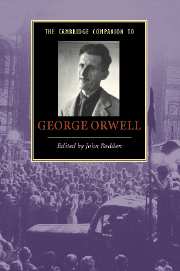Book contents
- Frontmatter
- 1 A political writer
- 2 Orwell and the biographers
- 3 Englands His Englands
- 4 The truths of experience: Orwell’s nonfiction of the 1930s
- 5 The fictional realist: novels of the 1930s
- 6 Orwell’s essays as a literary experience
- 7 ‘My country, right or left’: Orwell’s patriotism
- 8 Orwell and the British Left
- 9 Orwell, anti-Semitism and the Holocaust
- 10 Orwell, Socialism and the Cold War
- 11 Animal Farm: history as fable
- 12 Nineteen Eighty-Four: context and controversy
- 13 Orwell, the academy and the intellectuals
- 14 Orwell for today’s reader: an open letter
- 15 George Orwell: a bibliographic essay
- 16 Why Orwell still matters
- Further reading
- Index
12 - Nineteen Eighty-Four: context and controversy
Published online by Cambridge University Press: 28 July 2007
- Frontmatter
- 1 A political writer
- 2 Orwell and the biographers
- 3 Englands His Englands
- 4 The truths of experience: Orwell’s nonfiction of the 1930s
- 5 The fictional realist: novels of the 1930s
- 6 Orwell’s essays as a literary experience
- 7 ‘My country, right or left’: Orwell’s patriotism
- 8 Orwell and the British Left
- 9 Orwell, anti-Semitism and the Holocaust
- 10 Orwell, Socialism and the Cold War
- 11 Animal Farm: history as fable
- 12 Nineteen Eighty-Four: context and controversy
- 13 Orwell, the academy and the intellectuals
- 14 Orwell for today’s reader: an open letter
- 15 George Orwell: a bibliographic essay
- 16 Why Orwell still matters
- Further reading
- Index
Summary
Nineteen Eighty-Four is misread if not read in the context of its time - around 1948: a postwar world brutally and arbitrarily divided into spheres of influence by the great powers; the atom bomb exploded; and the fictive London of Winston Smith a recognisable caricature of the actual postwar London that Orwell had walked, and that this author can vividly remember. And three common misreadings can be challenged on biographical evidence. Firstly, Nineteen Eighty-Four was not his last will and testament: it was simply the last book he wrote before he happened to die. Secondly, it was not a work of unnatural intensity dashed off hastily by a man choked with a subconscious death-wish and regressing while writing the novel to childhood memories of his preparatory school (as some claim is demonstrated by his essay on school days, 'Such, Such Were the Joys' - as if the world of Stalin and Hitler did not exist). Thirdly, the book does not represent a repudiation of his democratic socialism as so many American reviewers assumed; for he continued to write for the Tribune and American left wing journals right up to his final illness, during the time of the composition of Nineteen Eighty-Four.
Yet for someone who consciously sought to become the master of the plain style, and is famous for it, it is astonishing how many varied interpretations have been put upon Nineteen Eighty-Four – the most famous of his works, although I think not his best. It has been read as deterministic prophecy, as a kind of science fiction or a dystopia, as a conditional projection of the future, as a humanistic satire on contemporary events, as a total rejection of socialism of any kind, and as a libertarian socialist – almost an anarchist – protest against totalitarian tendencies and abuses of power both in his own and in other possible societies. Most bad or partial readings occur through not grasping the context of the time – the immediate postwar period.
- Type
- Chapter
- Information
- The Cambridge Companion to George Orwell , pp. 146 - 159Publisher: Cambridge University PressPrint publication year: 2007
- 2
- Cited by

